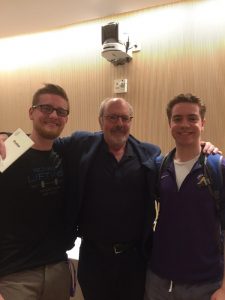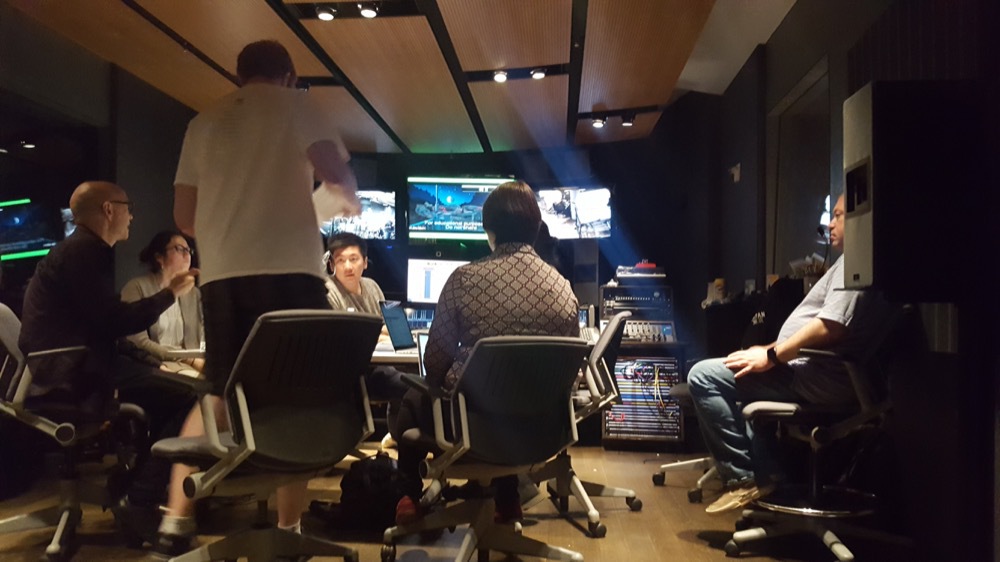The words Luke Mullet uses to describe his two weeks at a film scoring workshop this summer say a lot: “challenged” – “absolutely packed” – “massive increase” in understanding – “very stretched” – “extreme time crunch” – and “4 a.m.”
That’s how late the Eastern Mennonite University senior stayed up to meet a next-day deadline to score a two-minute movie clip during the New York University Film Scoring Workshop in May and June.

Mullet was one of just 20 participants in the chamber and soloist track of the workshop, which was headlined by such composers as 19-time Emmy nominee Mark Snow, best known for his wildly popular theme music to the TV hit series “The X-Files,” and Michael Levine, who has composed for film, television, games and advertising (his first major hit was the Kit Kat jingle). Among the featured guests were veteran music editors Suzana Peric (The Lord of the Rings: The Fellowship of the Ring, The Silence of the Lambs) and Todd Kasow (True Grit, Wonderstruck).
Instruction topics included creative processes and composition, technology, editing, recording and mixing and more.
Challenge and affirmation
One component of the workshop was taking the studio control room “hot seat” to direct and record percussion, hammer dulcimer and string quartet performers playing his clip composition, Mullet said. He then mixed those live recordings with electronic mock-ups, an experience that taught him “how to respond under the extreme time crunch that comes with professional recording.”

In subsequent public critique sessions, the professional composers provided feedback and tips.
Mullet was “very stretched by the general culture of the Hollywood-oriented composing world,” he said. “To be honest, it’s a tough atmosphere. You have to really have to be comfortable with showing off – and be able to take criticism in stride.”
But he also heard affirmation for his two-minute composition for a chase scene in The Bourne Ultimatum: NYU professor and professional composer “Mark Suazzo offered some encouragement – that I produced a solid piece of music,” he said.
Hobby seeds professional goals
Though Mullet has been creating electronic music as a hobby since he was in high school, he was “nudged” to take composition lessons with Professor Ryan Keebaugh. Thanks to that supportive relationship and numerous ongoing projects with students in the visual and communication arts (VACA) program, Mullet has reason to hope “it might go somewhere.”
One collaboration that VACA Professor Jerry Holsopple says has distribution potential appears in the trailer for an upcoming documentary about the Dakota Access Pipeline protests: an animation with Mullet’s music. Another is an upcoming VACA-created documentary No Longer Theory about MJ Sharp, slated to include music Mullet will compose as part of his honors capstone project.
His music is also featured in a behind-the-scenes video about that film’s making, called “Not Yet a Documentary,” another student’s video about designing cars, a timelapse video “The Process,” and more.
Mullet said he also “can’t stress enough” the role that Keebaugh played in his preparation for the workshop through composition lessons, technology tips and encouragement.
“Even though Ryan is a classical composer, lessons with him helped me develop a wide variety of composition skills that made this workshop possible,” Mullet said. “He’s an absolutely wonderful, thoughtful and inspiring instructor.”
The future
Mullet is set to graduate with a math degree, but on top of being a composer, too, he’s also a writer and poet.
“I love creating music and would love to make a larger career out of classical, film or video game composition,” he said. “That said, the values that I have been developing during my time at EMU might lead me towards some form of international service for a longer stretch of time.”
Music? Math? Sustainability? Service? They “will all be large components of my future work and studying,” he said.
